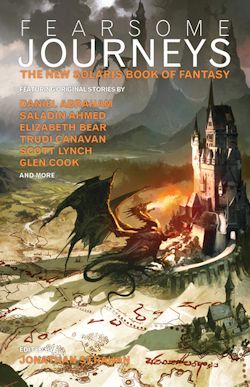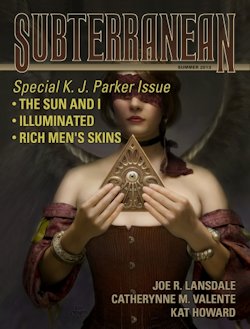Welcome back to the Short Fiction Spotlight, a weekly column dedicated to doing exactly what it says in the header: shining a light on the some of the best and most relevant fiction of the aforementioned form.
A confluence of fortunate events led to this special edition of the Short Fiction Spotlight.
I’ve been an admirer of K. J. Parker since the publication of The Folding Knife, which I read for review a few weeks before its release. At the time, it impressed me immensely—as did The Hammer the year after. Indeed, I declared that latter the best book of 2011.
Sharps I was ultimately less in love with. I may have rather over-indulged in Parker’s back catalogue in the intervening period, but by then he or she—for simplicity’s sake, let’s say she. That’s my guess, anyway—by then, then, she had surprised me so often that I came to Sharps expecting the unexpected, so when I finally read it, I read it intensely… and if the truth be told, I don’t know that Parker’s newest novel holds up under such ruthless scrutiny.
But though these books were what made me aware of this remarkable writer, in recent years I’ve found that Parker’s short fiction is at least equally awesome. As a matter of fact, I tend to think “A Small Price to Pay for Birdsong” is the very best thing she’s written, so when I saw that Fearsome Journeys featured an original piece by Parker—namely “The Dragonslayer of Merebarton”—I knew I’d be reading it as soon as the right opportunity arose.
Hot on the heels of making that promise in the course of composing the last column, Subterranean Press launched the summer edition of its fantastic magazine: a special Parker-centric issue, if you can credit it! Then, in their next newsletter, they announced that the aforementioned author was working on a gargantuan novel for them, in addition to putting the pieces of a truly epic collection together. Apparently, some higher power had figured out what I’d be reading this week well before I had!
Some higher power is exactly the subject “The Sun and I” addresses. It’s the tale of the cold, calculated creation of a religion: that of the Invincible Sun, a deity our narrator, Eps—meaning High Priest—and his essentially penniless pals come up with one day while brainstorming ways to make money.
“We could always invent God,” I suggested.
[…]
“What do you mean?” Teuta asked.
“I mean,” I said, “we could pretend that God came to us in a dream, urging us to go forth and preach His holy word. Fine,” I added, “it’s still basically just begging, but it’s begging with a hook. You give money to a holy man, he intercedes for your soul, you get something back. Also,” I added, as Accila pursed his lips in that really annoying way, “it helps overcome the credibility issues we always face when we beg. You know, the College accents, the perfect teeth.”
Nobody has any better ideas, so the group agrees to give God a shot. The absolute most they hope for is a reasonable return on their initial investment, which they spend—because you have to have money to make money—on appropriately noble robes and forgeries of supposedly holy documents.
Within ten days, however, the Church of the Invincible Sun takes off in a way none of the five friends had imagined.
It was a real stroke of luck that general Mardonius contrived to wipe out the whole of the Herulian Fifth army at the battle of Ciota ten days after we took to the streets to preach the gospel of the Invincible Sun. […] We were the crazy street preachers who’d predicted [the victory] and there’s a weird sort of pseudo-logic that operates in people’s minds. If you predict something, in some way or another you’re responsible for it, you made it happen. Suddenly, out of (no pun intended) a clear blue sky, the Invincible Sun was a contender.
Tragedy strikes a little while later: there’s an epidemic of mountain fever, but the so-called host make the most of it; they just so happen to have an alchemist among their number, who just so happens to have been testing a certain recipe in recent weeks. Simple coincidence? One wonders.
Eps wonders as well. Could it really be this easy to conjure a God whole-cloth, or have he and his companions have stumbled onto something much older and more powerful than they?
Could the Invincible Sun be real, for real?
As expected, “The Sun and I” is an immensely entertaining tale, of fortune, fate and something greater. With a wink and a smile from a more enlightened time thanks to the retrospective format of the narrative—which is told by an older and wiser Eps than the aspiring chancer we meet at the outset—Parker charts the religion’s unlikely rise with complete confidence.
The idea animating “The Sun and I” is a simple what if—what if you invented a God, and people actually began to believe in Him?—but Parker takes her story to some surprising places, and though it’s frequently funny, and on occasion rather reminiscent of encounters alluded to in the good book, rest assured that the author is not as dismissive of religion as the premise of this long and involved short suggests. Indeed, “The Sun and I” does not ultimately belittle belief in the least.
And who knows? You might even learn a little. This commandment impressed me especially:
Motive is irrelevant. The best things have been done for the worst motives, the worst things have been done for the best motives. Lusaeus the Slaughterer started the Fifth Social War because his people were oppressed by the Empire and he wanted the best for them. But Maxentius started a civil war because his people were oppressed and he wanted the best for them. The Fifth Social War was bad, because two million people died needlessly and countless more were left in hunger and misery. Maxentius’ war was good, because it freed the people and led to the Golden Age. Hunger is bad, freedom is good. Motive is irrelevant.
A cynical principle, certainly… but there really might be something to it, don’t you think?

In “The Dragonslayer of Merebarton” (featured in Fearsome Journeys), Parker turns her inimitable eye towards one of fantasy’s foremost tropes: the dragon, of course. That said, Parker’s dragon is frankly rather laughable—in appearance, at least.
I’d say the body was about horse-sized, head not in proportion; smaller, like a red deer stag. Wings absurdly large—featherless, like a bat, skin stretched on disturbingly extended fingers. Tail, maybe half as long again as the body; neck like a swan, if that makes any sense. Sort of a grey colour, but it looked green at a distance. Big hind lends, small front legs looking vaguely ridiculous, as if it had stolen them off a squirrel. A much rounder snout than I’d expected, almost chubby. It didn’t look all that dangerous, to be honest.
It is, though. It’s razed “three houses and four barns in Merebarton, two houses and a hayrick in Stile. Nobody [has been] hurt yet,” unless you count the dozen sheep the storybook beast has eaten, but it’s “only a matter of time.”
But let’s back up a bit, because before we meet the dragon, Parker introduces us to the man who will turn away this terror, or die trying—not that he fancies either idea. At the outset of the story, poor, dispirited Dodinas doesn’t even have a pot to piss in. He did, but it broke, and since he’s too cheap to pay a tinker to do the job properly, he’s in process of mending it himself—a harder task, I would add, than he had imagined.
A picture is emerging, I hope, of Dodinas le Cure Hardy; while he was active in chivalry he tried to do what was expected of him, but his heart was never in it. Glad, in a way, to be past it and no longer obliged to take part. Instead, prefers to devote himself to the estate, trying to keep the ancestral mess from collapsing in on itself. A man aware of his obligations, and at least some of his many shortcomings.
Be that as it may, he’s the only knight in town, so when the aforementioned dragon descends, Dodinas is promptly summoned to slay it. Single-handedly, certainly… but not alone—oh no!
Send for the knight, they’d said, not the knight and half the damn village. But a knight in real terms isn’t a single man, he’s the nucleus of a unit, the heart of a society; the lance in war, the village in peace, he stands for them, in front of them when there’s danger, behind them when times are hard, not so much an individual, more of a collective noun. That’s understood, surely; so that, in all those old tales of gallantry and errantry, when the poet sings of the knight wandering in a dark wood and encountering the evil to be fought, the wrong to be put right, “knight” in that context is just shorthand for a knight and his squire and his armour-bearer and his three men-at-arms and the boy who leads the spare horses.
What follows is, inevitably, an absolute farce, but equally the most practical portrayal of man versus myth I’ve ever read. The clash itself—which (brace yourselves for an in-joke, folks) made me go “oh”—is nasty, brutish and abominably short. Anticlimactic, perhaps, but Parker is all about playing with her readers’ expectations, oftentimes setting ’em up just to not knock ’em down.
Chekhov would not be amused, I’m sure, but I was, and if you’re a fan of Parker’s particular brand of madness, you will be as well. If you aren’t as yet, I do declare you don’t know what you’re missing.
That said, “The Dragonslayer of Merebarton” is one of K. J. Parker’s most rambling narratives. I still enjoyed it an awful lot, but it’s not her best by any stretch; “The Sun and I,” on the other hand, comes close. To a greater or lesser extent, then, both of these stories are emblematic of the winsome wit and cunning craft that I’ve come to expect from this incomparable clever-clogs of an author.
Niall Alexander is an erstwhile English teacher who reads and writes about all things weird and wonderful for The Speculative Scotsman, Strange Horizons, and Tor.com, where he contributes a weekly column concerned with news and new releases in the UK called the British Genre Fiction Focus, and co-curates the Short Fiction Spotlight. On rare occasion he’s been seen to tweet, twoo.










